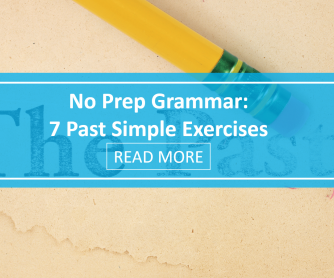
You’ve looked at the big list of irregular verbs and done all the worksheets, but your students still say,"I go yesterday." Here are ten, fun ways to practise the past simple and help your students remember how to use it correctly.
1. Speaking - Circle Interviews
Dictate 5 past simple questions. Make sure they are open questions so that students will have a lot to talk about - yes/no questions won’t generate much language. Arrange students in a horseshoe with some students seated on the outside and some on the inside. Allow students three minutes to ask each other the questions before you say ‘change’ and ask all the students in the inner circle to move left. In this way, students get to practise the same questions over and over again. As they talk, monitor and listen for good and bad use of the past simple which you can give feedback on when the task is over.
Example Sentences
1. What did you do last weekend?
2. Where did you go on holiday last?
3. What did you buy yesterday? Why?
4. When did you tell a lie? Why?
5. How did you come here today?
2. Verb Cards
Find a standard set of playing cards that you are happy to destroy. Using a marker, write irregular verbs on the plain side – make sure they are in the present tense. There are lots of games students can play with these in groups or in pairs and you can use the cards multiple times.
1. Place cards face down. Students take turns to take a card and say the correct past tense. If they are correct they keep the card. Continue until the deck is gone.
2. Students take a card from the pile. They make a correct sentence with the past tense of the verb. If the sentence is correct, they keep the card. Keep playing for five turns each. The student with the most cards wins.
3. Pass students five cards each. They use the past tense to tell a story about what they did yesterday. The best story wins.
3. Correct the Sentences
Display eight to ten sentences that are wrong in the past simple. Ask students to work in pairs to correct them before you elicit the answers. To make this more fun you could set a time limit with the first group to finish with the correct answers winning.
Sample sentences:
I go swimming yesterday. ( I went swimming yesterday.)
She speaked Spanish. (She spoke Spanish.)
I no went to the library. (I didn’t go to the library.)
Where did you went yesterday? (Where did you go yesterday?)
4. Positive to Negative
Tell students five sentences about your life last week and write these on the board to serve as a model. Ask your students to write five positive past tense sentences about the last week of their lives (not to copy yours!). Check the sentences are correct, if possible, before you ask students to share their papers with a partner. Their partner now rewrites the sentences in the negative form using ‘didn’t’. Ask students to share some of their answers with the class when you finish.
5. What I Did Yesterday
Ask students to write three positive and three negative sentences about what they did yesterday. Explain that two of the sentences must be lies. Circulate and correct as many of the sentences as you can before allowing students to share their sentences in pairs. Student have to work out which two sentences are lies. Have confident students share their sentences and play the same game with the class.
6. My Life Story
Tell your students about your life story. Use simple past tense sentences and include some negatives. Ask students to tell their partners about their own life stories using the past tense and remembering to include some negatives. Finally, students can write their life stories. Give them a time limit of say 20 minutes and a word count if you want to control how much they write. Ask students to stick their life stories on the wall for other students to read.
7. Tic Tac Toe
Draw the familiar tic tac toe grid with nine squares on the board and populate it with irregular verbs in their base form. Split the class into two teams, one team is noughts and the other crosses. The first team makes a sentence with just one of the verbs in the past tense. Write this on the board (even if it is wrong). If the sentence is correct, change the word to a nought or a cross. If it is incorrect, change the word to another past tense verb. Now it’s the other team’s turn. Continue in this way until one team gets a line of crosses or noughts.
P.S. If you enjoyed this article, please help spread it by clicking one of those sharing buttons below. And if you are interested in more, you should follow our Facebook page where we share more about creative, non-boring ways to teach English.








